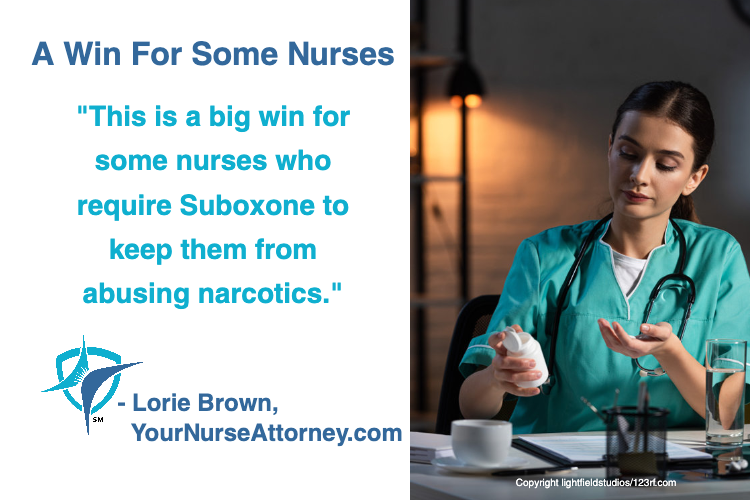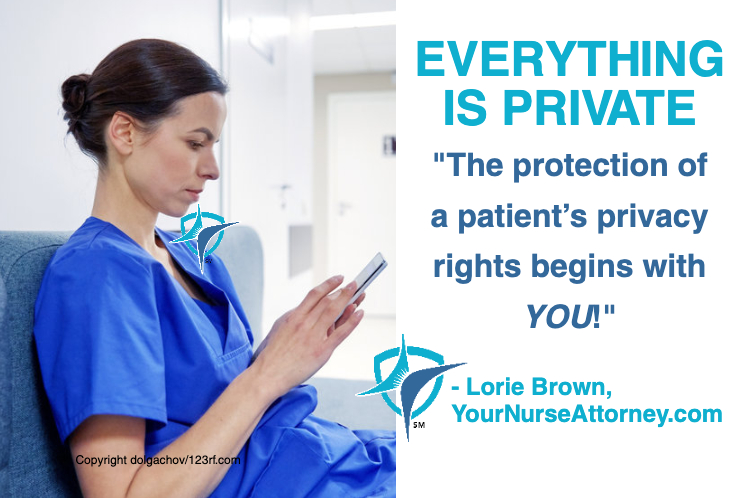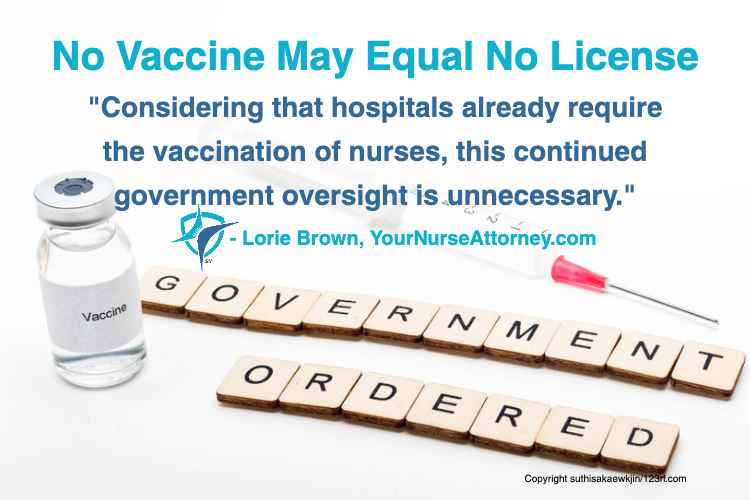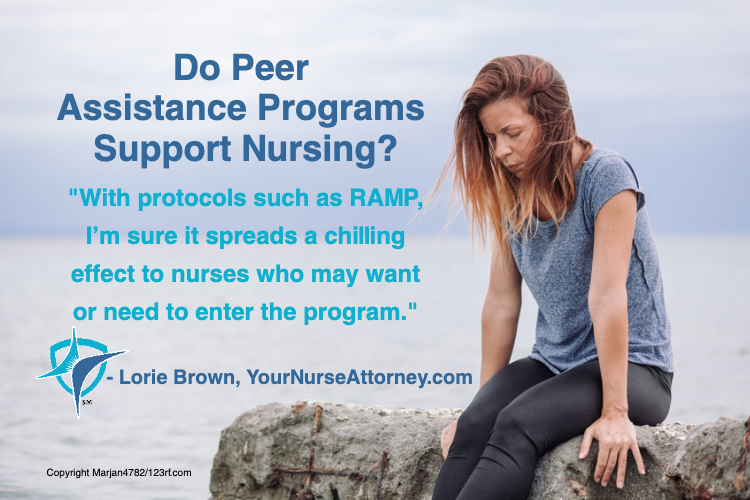A Win For Some Nurses
I do not believe any nurse wakes up in the morning saying to themselves, “I want to do drugs today!”
I consider substance use disorder (SUD) to be a biological condition where the brain has cravings for a particular substance, and nothing will alleviate it except getting that substance into their system.
Unfortunately, a nurse with SUD doesn’t just wake up and say, “I’m not going to do this anymore.” It usually requires treatment and intervention.
Some nurses suffering from chronic pain subsequently develop a SUD for which the pain can be alleviated only through the narcotic or Suboxone which relieves the craving as well as reduces the pain symptoms.
It is unfortunate that in Indiana the peer assistance monitoring program, Indiana Professional Recovery Program (IPRP), is an abstinence-based program by regulation. It was a regulation promulgated by the Indiana State Board of Nursing through the rule making process.
The Board has been inflexible with those who are on Suboxone who need monitoring.
An aggrieved nurse brought a complaint to the Department of Justice stating that she had been taking Suboxone and in solid recovery for a year. However, for her to get off that medication to participate in the monitoring program would be detrimental to her health and well-being.
The Department of Justice agreed and opined that a person with substance use disorder in recovery has a disability and public programs that prevent access, such as the peer assistance monitoring program (IPRP), is a violation of the Americans with Disabilities Act.
I know that throughout the years, nurses on Suboxone had to agree to revocation or suspension of their license until they could get off the medication before being allowed to participate in the program.
It will be interesting to see if the Board will change their rules to allow people who take Suboxone to participate in the program or if they will require monitoring elsewhere. This is a big win for some nurses who require Suboxone to keep them from abusing narcotics.
This also has additional ramifications for nurses who take Adderall for ADHD or take a controlled substance for epilepsy to prevent seizures or narcolepsy.
I am glad that the Department of Justice does not see this as “a one size fits all” approach and is meeting nurses with their disability where they are and requiring the Board to give them options.
Everything Is Private
Can you imagine seeing on social media a picture of a baby that was born with gastroschisis, a congenital disorder where the infant is born with the intestines outside the body?
That is what happened with a photo containing the caption of “My night was going great, then BOOM!”
A neonatal care unit nurse at Jackson Memorial Hospital in Florida decided to post this baby’s photograph and caption on Facebook without the consent of the parents or the hospital.
Clearly, this is a HIPAA violation!
Any healthcare facility employee who violates privacy rules of any patient is subject to disciplinary action which could include suspension or even termination. And nurse Sierra Samuels was terminated from her position at Jackson Memorial.
As of this writing, Ms. Samuels, who reportedly became a licensed practical nurse in 2015 and obtained her R.N. license 2 years later, still has a free and clear license. It is unknown what the Florida Board of Nursing will do hereafter.
As nurses, we see many striking things during our care of patients. But we can never share them with others, especially through social media. It is important to protect every patient’s right to privacy, no matter how old or young they may be. As in this case, even if the child’s face had not been shown, people knew where Samuels worked, and her actions could have exposed the child and parents for possible identification.
The protection of a patient’s privacy rights begins with YOU!
For example: you cannot post a photo of a room after a patient is discharged or passes away because if someone knew the room’s occupant was in that hospital, it could lead to the discovery of the patient’s identity. Another point, any items that are removed from a patient’s body cannot be photographed and disseminated through any means.
It is safest to never photograph or comment on anything and keep your work life private with no discussion, no photographs going outside the health care facility. Your license is too important to risk.
No Vaccine May Equal No License
The Oregon State Board of Nursing proposed new rules that would require nurses to be vaccinated as a condition for being licensed. Similarly, the Quebec Order of Nurses announced that their nurses must be vaccinated or face suspension of their medical licenses.
I can understand if your employer requires you to be vaccinated as that gives you the choice to either work for them or not. Besides, you can always get another job elsewhere.
Nevertheless, to take away all your choices to maintain your license, in my opinion, is an overreach.
While there may be legitimate and valid reasons for anyone to refuse to be inoculated, such as a medical condition or religious belief, to state unequivocally that a nurse must be vaccinated as a condition to keep a license is going too far.
The Oregon Nurses Association provided a survey showing 60% of nurses at that state’s largest hospitals are considering leaving the profession early. With the shortage of nurses and the increasing number quitting now rather than subject themselves to the mandates, early retirement of nurses only deepens the shortage of nurses and discourages potential new nurses from joining the dwindling ranks of the profession.
Considering that hospitals already require the vaccination of nurses, this continued government oversight is unnecessary.
Are there not places where nurses who choose to not get any of the vaccines can work safely? What about work from home triage? What about working for an insurance company doing wellness care from home? There are so many other avenues where nurses can be utilized without having to submit to government mandatory vaccinations in order to have a professional license.
Do Peer Assistance Programs Support Nursing?
In a recent article on MedPage Today the question is asked, “Are peer assistance programs defective and harmful to nurses”?
The article specifically discussed recent issues regarding the recovery and monitoring program (“RAMP”) in New Jersey. RAMP discussed how nurses cannot work during the intake process, which can take up to 90 days, after which a decision is made when a nurse can return to work.
It also discussed how costly RAMP is in that those nurses must pay a monitoring fee as well as for the testing which can range from $250 to $2000 depending on the type of evaluation required such as psychological, neurological or substance use.
While the program boasts their high success rates, it is very concerning to me that these programs are designed for nurses to keep their licenses, yet their licenses are promptly suspended for 90 days while the evaluation is being conducted.
In Indiana, nurses are referred to INPRP or ISNAP when there is an irregularity in documentation such as failing to witness waste, sign out or sign the administration of medication. Fortunately, Indiana does not immediately suspend a nurse’s license unless there is a clear and immediate danger to the public, and such is done only after the nurse is afforded an opportunity to be heard on the matter.
With protocols such as RAMP, I’m sure it spreads a chilling effect to nurses who may want or need to enter the program. I don’t believe there is a nurse anywhere who wakes in the morning thinking, “I want to take drugs” or “drink alcohol.”
Unfortunately, such abuse is a disease. Nurses need all the help that they can get. Nursing is stressful and getting even more stressful every day. We need to support our nurses who fall into addiction by providing them with support in a safe haven so they can continue working if they can safely do so or return to the workforce quickly.
In addition, if the nurse cannot work, such as with RAMP in New Jersey, it can be financially devastating to them.
Meanwhile, in Indiana, there is a needs assistance program available to help cover the costs of drug screens and monitoring, but that needs assistance is not guaranteed.
At a time when nurses are so desperately needed, I am hopeful they will be able to get the help they need in a caring compassionate environment so eventually they are again able to re-enter the workforce in a safe and healthy way.
- 1
- 2
- 3
- …
- 32
- Next Page »











